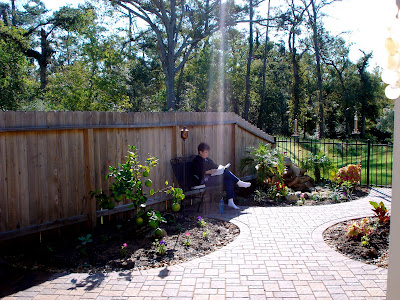The Baby Time Forgot
by Judy Vandiver
She took my hand and led me to the far northeast corner of the old cemetery. Kneeling down she began to pull weeds from a small unmarked grave. “This is where we buried him,” she said. I dropped to my knees and joined my small childish hands with her old creased ones and helped her clear the grave.
“Such a small grave,” I thought. “Tell me about him, grandma,” I pleaded.
“It was in the late 1930’s and I already had six children. He was my seventh child. His birth was not easy and I struggled for two days in labor with him. The doctor came from town and stayed at the house. He didn’t give much hope for me or the baby. Finally, however, a little baby boy was born. He cried once, and then stopped.
“Blue baby” are the words I remember hearing the doctor whisper to Grandpa."
“What is a blue baby?” I asked.
“Well, it seems my baby boy was not getting enough oxygen. This caused his skin to take on a bluish look. He didn’t live long and he died in my arms.”
The doctor told Grandpa that I didn’t have much of a chance of survival either. I wanted to go and be with my new baby, but I also knew that I had six other children depending on me. I prayed and I willed my body to fight back. When the doctor returned several days later, he was surprised to find me still alive. Another week passed and the doctor brought his wife to see me.
“I wanted my wife to see a miracle,” he said. “It is only by God’s intervention that you are still alive.”
“A part of me, however,” continued my grandmother as she yanked at some wayward dandelions, “was buried here years ago with my tiny baby son.” Continuing to pull the wild plants, I noticed that she carefully left a twisted and rampant honey-suckle vine.
Grandma continued to tell me more about this baby that had been my dad’s brother. I remember so much of what she told me, but the one thing I do not remember is the name she gave the baby.
More than 40 years after the death of her baby, my grandmother finally joined her son in heaven. One day recently, I asked my dad and his remaining siblings about the blue baby. Most of them had forgotten all about the little brother, and of those who did remember, no one could recall his name or where he was buried.
I drove four hours back to the old homestead and made my way to the old cemetery. Something inside me yearned to clear the weeds I was sure had grown over the grave. I tromped to the northeast corner, next to the graves skirting the edge of the woods. Suddenly it was twenty years earlier and my grandma held my hand.
“It’s just over here in the corner,” she said.
I listened for her voice. I tried to follow her footsteps. But I couldn’t find the wild honey-suckle vines or the grave. It seemed that time had stolen the memories that remained of this nameless relative. I imagine that a few generations from mine will have totally forgotten the blue baby.
“And what of me?” I thought. Will future generations know who I was or what I did with my life?” I thought of the third chapter of Ecclesiastes. "All go to the same place; all come from dust, and to dust all return. Who knows if the spirit of man rises upward and if the spirit of the animal goes down into the earth? So I saw that there is nothing better for a man than to enjoy his work, because that is his lot. For who can bring him to see what will happen after him?” In that same chapter, Solomon also tells us that God has set eternity in the hearts of men.
The promise of eternity with God, even in light of the fact that those who follow after us may not remember us or know much about us, calls us to be faithful. Like the baby that time forgot, future generations may not recall my name, but the work that I do for the Lord, will have everlasting effects. It is for this reason that I strive to do the Lord’s will and that I pray for those who will follow after me to also remain devoted to God.
Dear Lord, please let me live in a way that will bring glory to your name. Though I may be forgotten in time, may what I do help to promote you so that your words will never be forgotten or lost to future generations. Speak to those who come after me that they may know the same love of the Father that I know.
The Baby Time Forgot - copyright 2007 by Judy Vandiver
The Baby Time Forgot - copyright 2007 by Judy Vandiver



.jpg)












